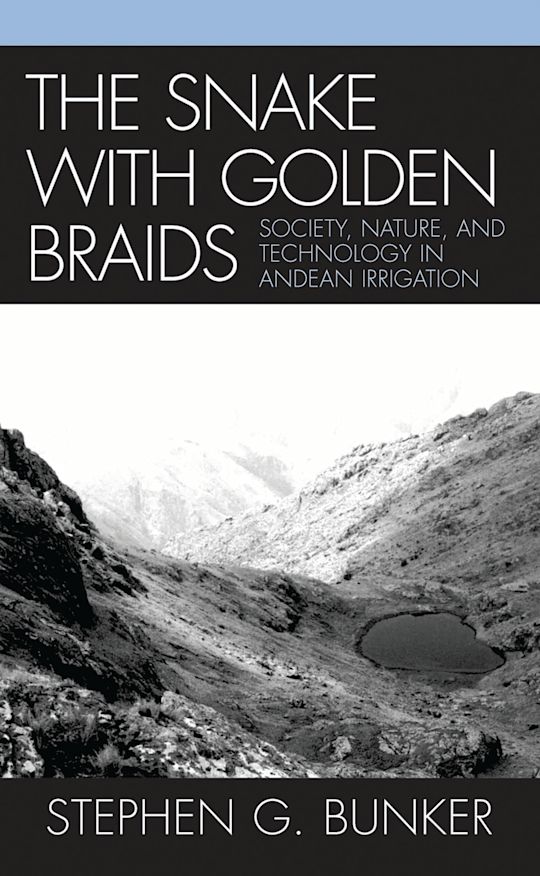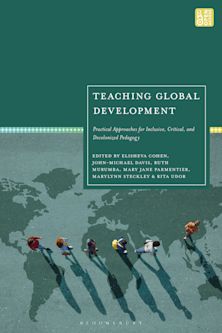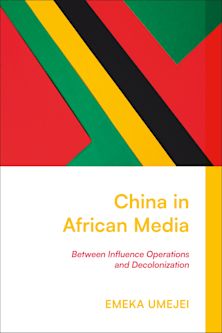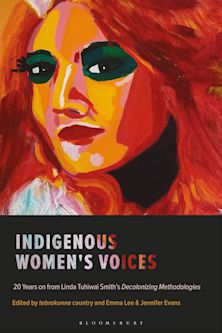- Home
- ACADEMIC
- International Development
- Society, Culture and Development
- The Snake with Golden Braids
The Snake with Golden Braids
Society, Nature, and Technology in Andean Irrigation
The Snake with Golden Braids
Society, Nature, and Technology in Andean Irrigation
This product is usually dispatched within 1 week
- Delivery and returns info
-
Free US delivery on orders $35 or over
You must sign in to add this item to your wishlist. Please sign in or create an account
Description
The Snake With Golden Braids seeks to understand how local inhabitants of the extraordinarily rugged Andean topography of Huanoquite, Peru came to understand their landscape and then build and maintain a system of irrigation ditches across it. The Huanoquiteno's original solution, a conceptually and architecturally complex irrigation system, was abandoned after the Spanish conquest of Peru, and replaced by a simpler, yet still complex, system, which is still in place today. Stephen G. Bunker combines a history of these systems with a rethinking of the local myths, legends, and environment to help make sense of the land and its uses. This book follows his intellectual and spiritual journey to learn not just about building and managing irrigation ditches, but about the very different ways of knowing the environment and the spirits of the earth that informed and empowered the original builders. Bunker's first-hand experience and research will prove an invaluable asset to sociologists, anthropologists, and environmentalists.
Table of Contents
Chapter 2 Mountains, Rivers, and Valleys
Chapter 3 Fitting Tame Ditches into a Wild Landscape
Chapter 4 Power, Property, and Technology
Chapter 5 Cosmology, Society, and Nature
Product details
| Published | Apr 13 2006 |
|---|---|
| Format | Hardback |
| Edition | 1st |
| Extent | 136 |
| ISBN | 9780739111970 |
| Imprint | Lexington Books |
| Dimensions | 9 x 6 inches |
| Publisher | Bloomsbury Publishing |
About the contributors
Reviews
-
Although the engineered landscape has received considerable attention in anthropological and historical circles, few researchers have provided the observational detail that informs this book. By assessing the elaborate irrigation efforts of prehispanic societies in this region of the Peruvian Andes and contrasting them with subsequent hacienda systems as well as recent agrarian reforms, we are introduced to the fundamental organizational underpinnings acting on the landscape. Bunker shows how local places are linked by the movement of water and how cosmology and environment become codependent, though biophysical principles remain the ultimate arbiter in this topographically severe setting. Socially imbued place codifies myth, ritual, and belief. The author reveals how we all write own histories on a landscape, and how these culturally inscribed histories reconfigure aspects of the natural world. How we organize ourselves within our built environments and what technologies we chose to implement provide lessons for the future and will affect our longevity on this planet.
Vernon L. Scarborough, University of Cincinnati
-
This book is the fullest realization of Bunker's prior work. In a devoted, painstaking and deeply respectful way he explores the intimate interconnections between a challenging Andean environment and its inhabitants. Attending to topography, investigation of the remains of the waterworks, and the cosmology and stories of contemporary Huanoquitenos, Bunker reconstructs the breathtaking technological achievement of the prehispanic people who irrigated the region. This is no story of humans taming the earth, but of how, in allowing us to solve the problems it poses, landscape shapes human strategies and consciousness.
Jane L. Collins, University of Wisconsin, Madison
-
A brilliant and necessary synthesis of interpretive humanism and cultural ecology that also shatters the spurious academic polarity between the Andean and Amazonian cultural systems of knowledge. This book is essential reading for all Latin Americanists, and contributes to such distant disciplines as human ecology and philosophy, as well as sociology, anthropology, and environmental studies.
Norman E. Whitten Jr., University of Illinois at Urbana-Champaign, and author of Histories of the Present: People and Power in Ecuador
-
Stephen Bunker provides a nuanced analysis of the social and environmental history of Andean irrigation canals and their impacts on rural landscapes and society. He skillfully weaves together how biophysical limitations, material processes, and eco-cosmology promote the production or deterioration of irrigation canals.
H-Net: Humanities and Social Science Reviews Online
-
In The Snake with Golden Braids, Stephen Bunker examines Andean irrigation culture through a fascinating and unique analysis of technology, landscape and mythology. This book is truly an amazing work and an excellent model for multidimensional analyses of cultural phenomenon.
Donald R. Cochran, Ball State University



































